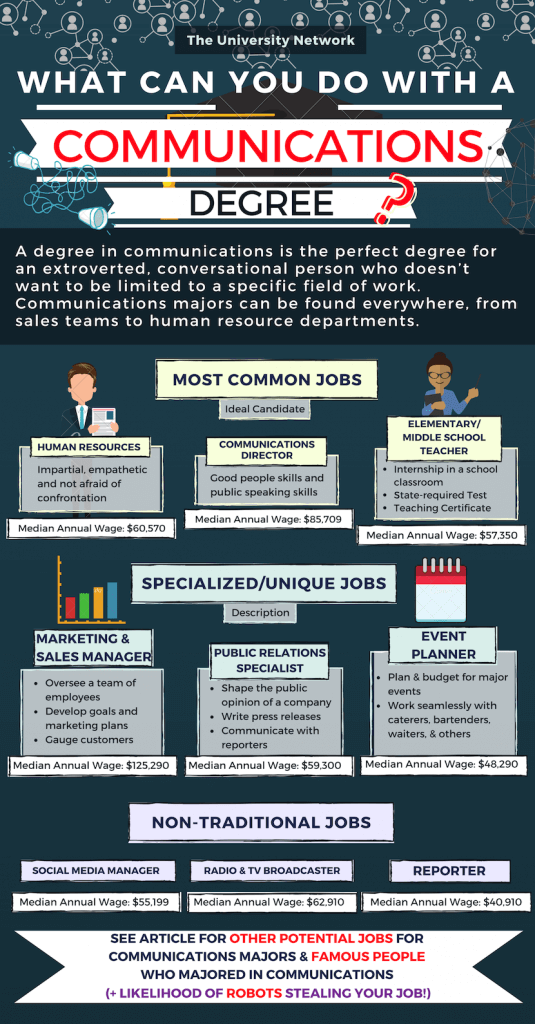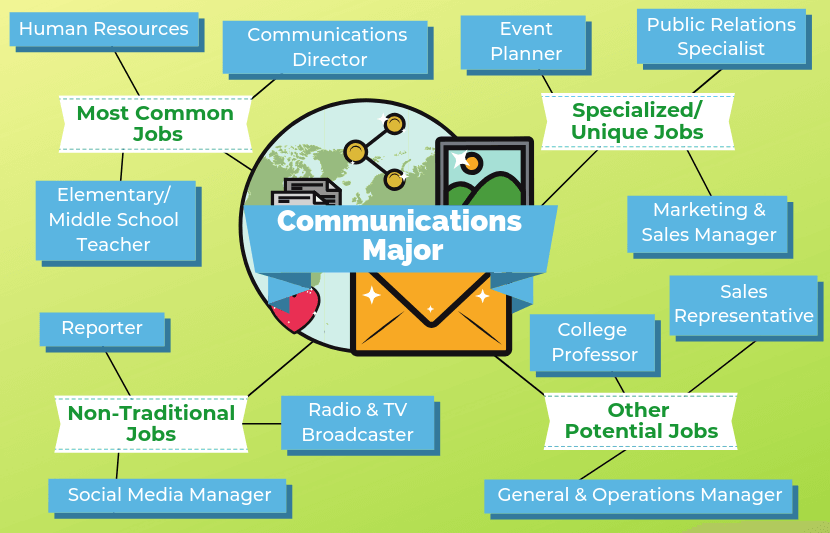Communications Jobs

A degree in communications offers many opportunities for employment. It is the perfect degree for an extroverted, conversational person who doesn’t want to be limited to a specific field of work. Career options include both full time and part time positions, and positions can range from internships to senior executives. Communications majors can be found everywhere, from sales teams to human resource departments. Nearly every company needs a communications expert.
Here is a list of 12 possible jobs for communications majors:
Common Jobs For Communications Majors

1. Human Resources

Human resources (HR) positions are very common in a wide range of industries. Essentially, they are responsible for all employee relations. HR personnel typically are the people who do the hiring, firing and mitigating within a company. Good HR employees are impartial, empathetic and not afraid of confrontation.
Median annual wage: $60,570
Common entry-level degree: Bachelor’s degree
Likelihood that robots will take your job: 31%
2. Communications Director

Communications majors often develop very good people skills, which makes them ideal candidates for directorial positions. Communications directors are tasked with creating a company message and finding effective strategies to relay it to the public. At large companies, communications directors may also be required to publicly address the media, essentially serving as the “face” of the company
Median annual wage: $85,709
Common entry-level degree: Bachelor’s/Master’s degree
Likelihood that robots will take your job: Unknown
3. Elementary/Middle School Teacher

After earning a bachelor’s degree, those who aspire to teach in elementary or middle schools have to complete an internship in a school classroom, pass the state-required test for teachers and receive a teaching certificate/license.
If you are dead set on being a teacher, the best advice would be to major in education. But if you’re still uncertain about what you want to do, a communications major could ultimately help you land a teaching job.
Median annual wage: $57,350
Common entry-level degree: Bachelor’s degree & teaching certificate
Likelihood that robots will take your job: 0%

Specialized, Unique Jobs for Communications Majors

4. Marketing & Sales Manager

Marketing and sales managers are generally asked to oversee a team of employees, develop goals and marketing plans, and gauge their company’s customers in order to target them effectively. For marketing and sales managers to be successful, they typically need to develop empathy skills and stay up to date on the trends that shape their company’s target audience.
Median annual wage: $125,29
Common entry-level degree: Bachelor’s degree
Likelihood that robots will take your job: 1%
5. Public Relations (PR) Specialist

PR specialists have a similar responsibility to communications directors — they both are tasked with shaping public opinion of a company. But the difference is, communications directors have to think big picture, while PR specialists are generally assigned to execute individual tasks. Typical assignments for PR specialists include writing press releases and communicating with reporters to try to increase publicity for their company.
Median annual wage: $59,30
Common entry-level degree: Bachelor’s degree
Likelihood that robots will take your job: 18%
6. Event Planner

While it may seem simple on the surface, planning a major event takes a lot of organization, time management and improvisation. While there technically is no degree required to become an event planner, studying communications can help you develop the people skills required to pull off planning a major event, such as the ability to negotiate effectively, budget properly and work seamlessly with caterers, bartenders, waiters and others.
Median annual wage: $48,290
Common entry-level degree: Bachelor’s degree
Likelihood that robots will take your job: 4%
Non-Traditional Jobs for Communications Majors

7. Social Media Manager

Clearly, social media management is a relatively new occupation. As social media continues to grow, more and more brands are using social channels for marketing purposes, especially if their target audience is millennials or Gen Zs. Because of that, many colleges and universities have started offering social media certification or specialization programs. Good social media managers understand the ins and outs of every social channel and have the ability to keep track of a rapidly evolving industry.
Median annual wage: $55,199
Common entry-level degree: Bachelor’s degree & social media certificate
Likelihood that robots will take your job: Unknown
8. Radio & TV broadcaster

Radio and TV broadcasters have to be fun, clever and interesting enough to attract listeners and viewers. This job pairs well with communications majors, because they often develop good people skills, are relatable and, most importantly, know how to sell themselves. Like many other occupations, broadcasting isn’t something you can just jump into. To get a sense of the industry, people interested in broadcasting should apply for internships. There is much more that goes into broadcasting than what the public sees on TV or hears on the radio.
Common entry-level degree: Bachelor’s degree
Likelihood that robots will take your job: 7%
9. Reporter

Technically, there is no required degree to become a reporter, but you will have a hard time finding a job without one. Skilled reporters are master storytellers with strong writing and grammar skills. To learn the essential skills, most aspiring reporters study journalism in college. However, the empathy and conversation skills taught through communications can translate to reporting and enable communications majors to write deep, descriptive stories.
Median annual wage: $40,910
Common entry-level degree: Bachelor’s degree
Likelihood that robots will take your job: 11%
Other Potential Jobs For Communications Majors

10. College Professor

Patience, communication, organization and enthusiasm are some of the most important characteristics of a good college professor. To earn a job teaching at the post-secondary level, a master’s degree (and sometimes a doctorate degree), is required. In addition to teaching, some college professors also conduct research and write scholarly articles.
Median annual wage: $64,480
Common entry-level degree: Master’s degree
Likelihood that robots will take your job: 3%
11. General & Operations Manager

Because of their ability to work with people, communications majors often make good managers. However, the title of “general and operations manager” is very vague — it could apply to nearly any job field. So, while having a communications degree is a plus, in order to earn a managerial job, candidates should have prior experience in the specific industry they want to land a managerial job in. For example, someone applying for a job as a business operations manager should also have a degree in accounting, economics or something else business-related.
Common entry-level degree: Bachelor’s/Master’s degree
Likelihood that robots will take your job: 16%
12. Sales Representative

Like many of the other jobs on this list, sales is a good occupation for communications majors because of their ability to interact with other people. Requirements vary from company to company, but good sales people should be able to speak comfortably with anyone at any time. Because sales jobs often involve cold calls, good sales people should also be able to quickly bounce back from rejection.
Median annual wage: $52,460 (varies heavily)
Common entry-level degree: High School Diploma – Bachelor’s Degree
Likelihood that robots will take your job: 85%
Analysis of the Importance of Communications in Modern Campaigns
In today’s rapidly evolving digital landscape, effective communication has become more crucial than ever for organizations seeking to connect with external audiences. Communications jobs, particularly within specialized teams, play a pivotal role in designing and executing communication campaigns that not only engage stakeholders but also enhance the visibility and optimization of search results. This analysis explores the multifaceted importance of communications roles in achieving these goals.
1. Strategic Message Development

Communications teams are responsible for crafting clear, compelling messages that resonate with target audiences. This involves extensive research to understand audience needs, preferences, and behaviors. By developing strategic messaging frameworks, these teams ensure that communications are not only consistent across platforms but also tailored to maximize engagement. In a crowded information landscape, this differentiation is key to capturing attention.
2. Brand Management and Reputation Building

In an age where public perception can shift rapidly due to social media and online reviews, effective communication campaigns are vital for brand management. A dedicated communications team helps shape narratives around an organization, fostering a positive reputation. This proactive approach to reputation management includes responding to crises and highlighting achievements, which can significantly impact consumer trust and loyalty.
3. Engagement with External Audiences

Communications teams leverage various channels—social media, email, blogs, and traditional media—to engage external audiences. By creating targeted campaigns, these teams can effectively reach specific demographics, increasing the likelihood of audience interaction. Engagement not only fosters community but also encourages user-generated content, which can enhance organic reach and improve search visibility.
4. Search Engine Optimization (SEO)

The integration of SEO practices into communication strategies is crucial for enhancing online visibility. Communications teams utilize keyword research to ensure that content aligns with what potential audiences are searching for. This includes optimizing web pages, blog posts, and press releases to increase search rankings. By producing high-quality, relevant content that addresses audience queries, organizations can improve their search engine results, driving more traffic to their websites.
5. Data-Driven Decision Making

Modern communications roles increasingly rely on analytics to inform strategies. By analyzing data from previous campaigns, communications teams can understand what works and what doesn’t. This data-driven approach enables them to refine messaging, optimize content for search engines, and ultimately increase the effectiveness of campaigns. Continuous monitoring and adjustment based on audience response ensures that communication efforts are relevant and impactful.
10 Famous People Who Studied Communications

1. Stephen Colbert
2. Ellen DeGeneres
3. Jimmy Fallon
4. Chris Farley
5. James Gandolfini
6. David Letterman
7. Matthew McConaughey
8. Al Roker
9. Howard Stern
10. Wendy Williams
To explore options for other majors, click here.



